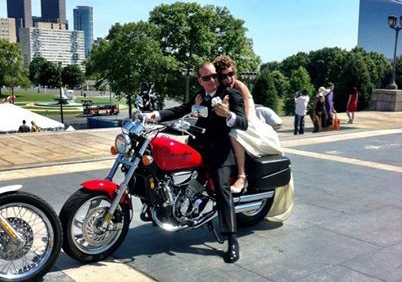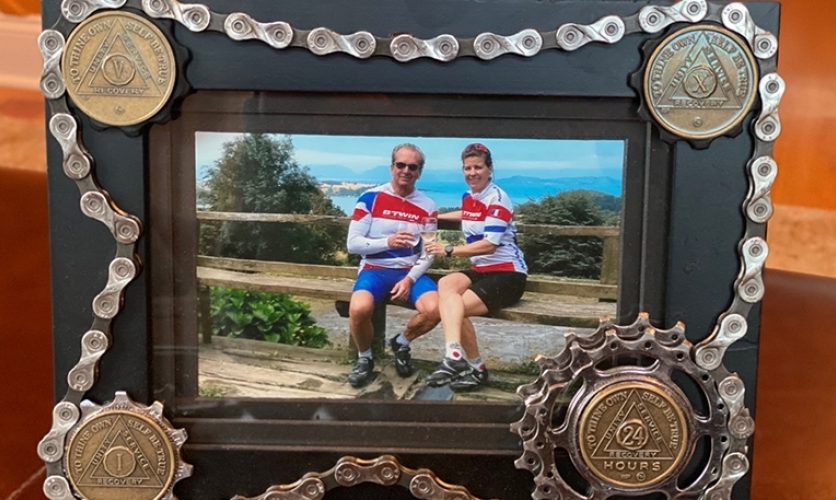Treatment and Recovery Made Us Stronger as a Couple
It’s almost that time of year again. February 17th, my sobriety date. This year marks 11 years in recovery. As I sit in my home office, a France cycling guide on my lap, I focus on the photo Chantal gave me last year to celebrate my 10-year anniversary while we were cycling in Myanmar.
I love both the photo and the frame. Chantal and I are in Chile, wearing French cycling jerseys, a volcano in the background and a group of fellow adventurers just out of view. We are fit, smiling and doing what I love most: exploring. That’s the gift of recovery in my life, right there in that photo with a cycling chain that holds together my 24 hour, 1 year, 5 year and 10 year AA coins.
When I left my career as a CEO of a Fortune 500 company, I had no idea that moving across the country, my mother dying, and an acrimonious divorce would send me into free fall. I lost my grip on life, myself and my drinking. But it was a private war because I was that high-functioning alcoholic.
Just as I started my new life with Chantal in a home that was so us, elegant and eclectic, with paintings and sculptures we had each collected during our own expat lives from cultures as different as Russia, Thailand, France and Mexico, I could not put down the drinks. Vodka seeped into my morning juices. My private war turned into an all-out battle between us, hidden behind the appearances we kept. Neither of us understood what was happening, individually or together.
I remember telling Chantal, sitting in this same chair all those years ago, that if I could not bring my mountain bike to Caron, I would not go! I came that close to not going into treatment.
I got sober and still am, but recovery, that was an entirely different thing. That part took 30 days at Caron, AA, therapy (lots of it—as a good CEO I fired at least four of them and negotiated my way out with the last) and a few AA sponsors. I followed Chantal to couples’ communication workshops, I agreed to retreats, went to Shamballa meditation, journaled, went back to Caron for its Breakthrough program, joined a men’s group, let my frustration loose in kickboxing and walked the dark road of guilt to the center of my soul and back. I made painful choices, like delaying our wedding, resisting medication and rebelling mostly against myself.
Those four coins on the frame, I earned them with a lot of sweat and often silent tears. I don’t like what this disease has done to me, my three children and ex-wife and especially to Chantal.
But in some crazy way, it’s also given me my life back. Recovery has given me the ability to love Chantal in a way I didn’t know before. From the quiet moments listening to the loon on the dock in Quebec, to the parties we’ve had mixing our neighbors, friends and AA networks, to hiking Patagonia, to introducing Chantal on stage when she launched her first book, to mentoring a Thai young man, to being a Rotarian and living my life fully. That’s life on life’s terms.

As I edit my manuscript for my next book, Love Without Martinis, while Bill plans our next cycling trip to France, my eyes drift to our wedding photo on his desk. I smile every time I see it. I love the way the photo captures our gusto for life. Bill looks so handsome in his tuxedo, and I look healthy in my wedding dress. We are sitting on my red Honda motorcycle at the top of the Art Museum stairs with Philly at our feet.
Bill was four years sober and I was almost two years into remission from ovarian cancer. We had already navigated so much together. I felt ready to say I do. Two years after that, I was not so sure anymore, and one year after that, I was seriously considering a divorce.
I was resentful of all my time in therapy, fed-up with Al-Anon and exhausted with the chaos of our blended family that wouldn’t blend. The promise of recovery was falling short. At the same time, I could not give up on my conviction that Bill and I had the possibility of exploring life together in a magical way. Some days I disliked him as much as I loved him and felt the same about myself.
I was struggling to understand the collateral damage that addiction caused. I was still learning to separate Bill’s substance use disorder from the man I loved. I was stuck in my personal growth and kept asking myself, how did I get here? I put myself through law school, worked for one of Canada’s best law firms, developed into a solid negotiator and built a global legal team as general counsel. How did I get here?
It took the same perseverance, the same determination and even harder work than my career to untangle the hold that Bill’s addiction had on my soul and in my life. Without the support of Caron’s Family Education program, Al-Anon, people who had walked the path before me and the close friendships, I may still be caught back there somewhere.
I know now, in a way that I did not before Bill, that we embarked on this path, that our love is strong and fragile, and that it can withstand, but recovery cannot be taken for granted. I also know that I love the life we have created together. The support he gives me when I write. How much fun it is to get all muddy on the trails and then get dressed up to go see dance at the Annenberg with him. How he hugs me when I choke up because my great uncle Terri is gone. That we have some private jokes and he calls me Blue Eyes. I can think of a hundred more reasons why our life together is worth all the effort we put into our relationship and our recovery.
We both agree with Earnie Larsen:
“The core of recovery is becoming a person increasingly capable of functioning in a healthy relationship.”
Related Content
Take the next step:
Start a conversation
Start with an online form
-
Caron in Pennsylvania
1-800-854-6023 -
Caron in Florida
1-800-221-6500 -
Breakthrough at Caron
1-800-213-7834




